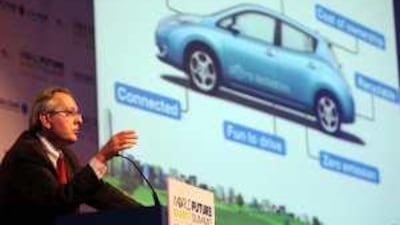ABU DHABI // Electric cars will help reduce the carbon emissions that cause climate change, but their widespread use remains at least five to 10 years in the future, industry leaders told the World Future Energy Summit yesterday. The principle hurdles are the high cost of batteries and consumer reluctance to buy cars that can go only a limited distance before requiring a new charge, said Alan Lloyd, the president of the International Council on Clean Transportation.
How quickly electric cars are adopted by consumers will have important implications for oil exporting countries, because the global transport sector remains the biggest consumer of oil-based fuels. Electricity, by contrast, is produced principally from coal, nuclear and renewable sources. Mr Lloyd said he learned from a previous attempt to introduce cars in California that the technology will take many years to succeed in the marketplace.
"Things always take much longer than you think," he said. "In terms of stopping oil consumption, I don't think you have to be worried about that." Hybrid cars, powered by a combination of electricity and petrol, were highlighted at the summit earlier this week when Toyota was awarded the Zayed Future Energy Prize for its Prius model. Yesterday the focus was on fully electric cars, which will make up 10 per cent of the world vehicle fleet by 2020, predicted Pierre Loing, the vice president for product planning and zero emission at Nissan.
Nissan's first electric car, the Leaf, will launch later this year. The battery, which costs an estimated US$10,000 (Dh37,000), will be leased to consumers, but the car will still initially require government incentives and tax credits in targeted markets to help make the vehicle competitive with conventional vehicles, Mr Loing said. "We have to compete, from a customer point of view, with an item the internal combustion engine that is highly cost competitive," he said. "We expect within a certain time, probably five to seven years, the electric vehicle with the battery will be able to compete head-to-head with the internal combustion engine."
The electric car's advantage will come in the form of lower fuel costs, since the cost of travelling with electricity is far lower than with petrol. Over its lifetime, the Leaf will cost 10 to 15 per cent less than a vehicle powered by a petrol engine, Mr Loing said. The problem for the industry is that if the vehicle is sold with its battery, it is far more expensive than the up-front cost of a conventional vehicle, said Jan-Olaf Willums, the chief executive of Think Global, a Scandinavian firm that produces a low-cost electric car.
"Normally the individual doesn't count how much the car really costs," he said. "Normally you buy a car and you don't buy 10 years of fuel the same day." The first markets targeted by car companies should be customers that own fleets of vehicles, he said, like taxis and car rental agencies. "Car sharing and car rental concepts are the right way to get people comfortable," he said. "One of the big first owners will be the car sharing companies and the fleet owners because those are the people who understand the full lifetime costs"
Mr Willums disagreed with forecasts that electric cars would take five years to get on the road, noting that with better financing for batteries, the vehicles could already be competitive in some markets where conventional vehicles are costly. "There are opportunities today if you find the right financing models," he said. Think Global will lease batteries to consumers and is also developing a market for the batteries after their service life in the car has expired, he said.
But customer perceptions of the limits of electric cars remain a big risk, executives agreed, because they have limited ranges and few options for recharging. The Nissan Leaf, for instance, has a top range of 160km that falls within the daily distances covered by 80 per cent of drivers, Mr Loing said. But the company has also set up partnerships with more than 30 governments to build commercial recharge stations across cities, he said.
@Email:cstanton@thenational.ae

